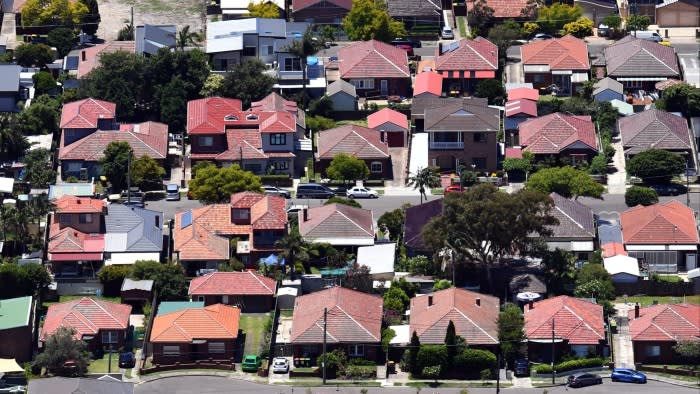Stay informed with free updates
Simply sign up to the Global Economy myFT Digest — delivered directly to your inbox.
The widespread drop in global house prices that hit advanced economies has largely petered out, according to a Financial Times analysis of OECD data, leading economists to predict that the deepest property downturn in a decade has hit a turning point.
Across the 37 industrialised OECD countries, nominal house prices grew 2.1 per cent in the third quarter of 2023 compared with the previous three months, up from near stagnation at the start of last year.
Only about one-third of those countries reported a quarter-on-quarter decline in the latest period, down from more than half at the start of the year, according to the FT analysis.
“The most recent data suggest that house price falls have now bottomed out in most countries,” said Andrew Wishart, senior property economist at Capital Economics. “I think we’ve had the house price correction that we’re going to get.”
Housing prices took a hit in late 2022 after central banks in most economies raised interest rates at the fastest pace in decades to curb inflation. In OECD countries, house prices grew by just 0.6 per cent quarter on quarter at the end of 2022, the lowest nominal rate since 2012.
However, that decline has eased or even reversed in many economies as expectations that central banks will cut borrowing costs this year have helped mortgage rates to decline. A shortage of properties for sale has also helped to prop up valuations and real prices across the OECD returned to growth in the latest quarter.
House prices are increasing or stabilising in most advanced nations, while other countries are seeing falls at a slower rate. Prices are likely to fall further in some countries such as Germany, Denmark and Sweden, which have larger rental markets, “but even in these economies we think that most of the fall in prices is already behind us”, said Wishart.
House prices are “close to the bottom in many places and recovering in a lot of places”, said Tomasz Wieladek, economist at investment company T Rowe Price. He said that migration and restrictive planning permission had kept the pressure on house prices in many countries, including the UK, Canada and Australia.
Households will continue to face higher mortgage costs as they come off fixed-rate deals, but many face better terms compared with last year. While UK and the US mortgage rates have ticked up in February, they remain well below national peaks reached in 2023.
House prices have held up best in the US, where solid economic and job growth helped nominal house prices to rise 5.2 per cent in the year to November.
Germany, by contrast, where economic woes, property overvaluations and a large rental market weigh on the sector, saw a 10.2 annual contraction last year — the worst of the EU economies excluding Luxembourg.
In Australia and New Zealand, house prices are growing again, national data shows, while in Korea they have stabilised after hitting a trough in mid-2023. In the EU, they rose at a nominal rate of 0.8 per cent quarter on quarter in the three months to September, reversing the fall seen at the start of the year, Eurostat data shows, though they were still 1 per cent lower on an annual basis.
“We believe that the correction in housing prices in Europe is not over yet, but we have probably seen the worst of it,” said Sylvain Broyer, chief economist of EMEA at S&P Global Ratings. He expects the price correction to continue in some countries, as mortgage payments remain elevated and high building costs that have kept prices high are expected to decline.
However, the remaining correction “is going to be a moderate one”, said Broyer.
The global house price decline has been generally milder than expected. Fitch now estimates nominal prices grew 6 per cent in the US last year, down from a previous forecast of up to a 5 per cent contraction, while in the UK it predicts a milder 2 per cent contraction in 2023 compared with a previous estimate of up to 7 per cent. The better forecasts are partly because high inflation hid the scale of the decline, economists said.
In some economies, including the US, Australia and the UK, the market has shown unexpected resilience and the house price correction has not wiped out the large gains seen during the coronavirus pandemic, either in nominal or real terms.
But in some countries outside the OECD the picture is different. In China, which has been experiencing an acute housing downturn, Fitch forecast house prices would continue to fall for the next two years, warning that investment demand “has mostly vanished” following a 7 per cent price contraction over the past two years.




